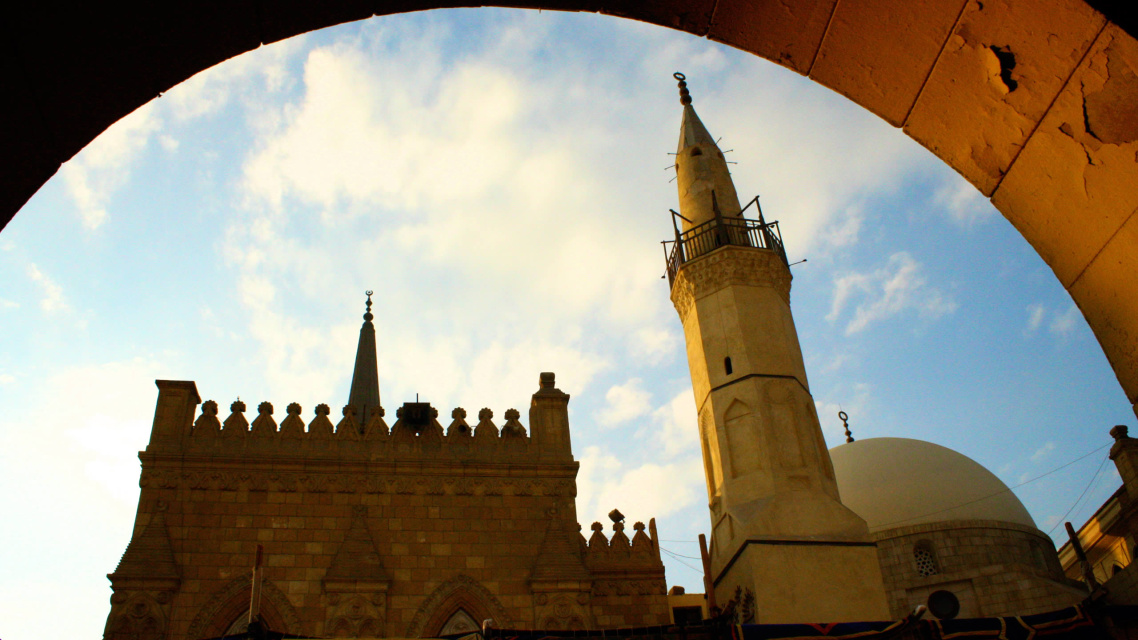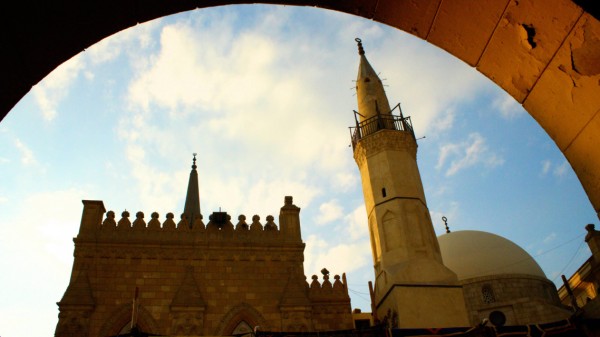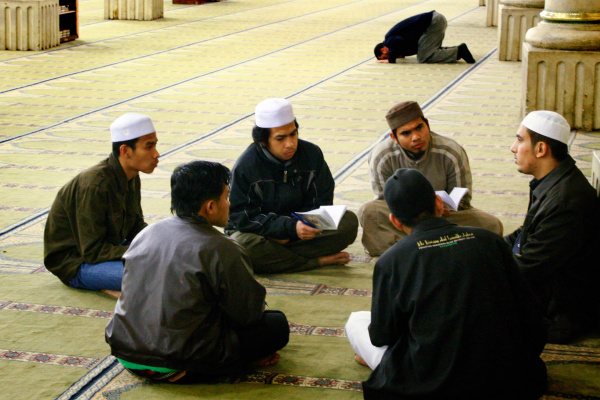

On Alexandria’s seafront, the villainy of Hosni Mubarak and his cronies is on parade. Once-grand buildings along the Corniche look like they have survived a civil war; pockmarked, broken, abandoned. Alexandria, like much of Egypt, has been brought close to ruin by decades of neglect.
What used to be Egypt’s most cosmopolitan city is now home base for many of Egypt’s most powerful Salafis, the hardline Islamists whose political arm, Al-Nour, now controls a quarter of the parliament. Their campaign posters line the Corniche’s crumbling concrete walls, cheek-by-jowl with opponents’ from the comparably pragmatic Muslim Brotherhood’s Freedom and Justice party, which holds nearly half the parliament.
In 2009, the acclaimed Egyptian writer Alaa al Aswany wrote that there were two battles being waged in Egypt: one for democracy, the other for Egyptian Islam. “Egypt is defending its civilised and open-minded interpretation of Islam,” he wrote, “against the invasion of reactionary and regressive Wahhabi ideas that are liable to … turn our great country into a Taliban emirate.”
This battle announced itself again last year. In March and April, as the country roiled with post-revolution protests, Salafis attacked Sufi mosques and shrines across Egypt. Then they targeted 16 more for destruction in Alexandria.
The Sufi Sheikh Alaa Abul Azayem, of the Al-Azmeyya order, warned that if the attacks were to persist, there would be a civil war “beyond imagination.” Sufi orders dispatched members to protect their shrines. Salafi leaders denied official knowledge of the attacks. The Brotherhood offered to broker a peace between the two groups, “to avoid problems in Egypt that may destroy everything and everybody in the event of an armed conflict.”
The apolitical Sufis have always supported a separation between church and state. Despite this, many Sufis voted Brotherhood at the recent elections. The question now is: Will the Brotherhood defend Egypt’s mainstream, tolerant version of Islam, or bow to the Salafis and the hardliners in their own party? One shot already has been fired across the bow: Last week, a Salafi MP was chosen to head the parliament’s education and scientific research committee.

Sufis are referred to as a minority in Egypt. Fifteen million of Egypt’s 85 million people are officially registered as Sufis; the true figure is likely to be higher, and their influence should not be underestimated. “Most Egyptian Muslims practice a Sunni type of Islam influenced by Sufism, but they don’t announce it – or even know it,” says Ahmed Elgammal, an expert in theology and columnist for Egypt’s Al-Ahram newspaper.
More tellingly, all of Egypt’s fatwas, its Islamic laws, are issued by al-Azhar Mosque, the oldest and most important seat of Sunni learning in the Arab world, and its teachings are intrinsically connected with Sufi philosophy; the two sheikhs leading al-Azhar are both Sufis. Salafis, says Elgammal, are the virtual antithesis of Sufis.
“Salafists are literalists,” he says, resting his cigar on a glass ashtray on his desk. “They refuse any opinion [on the Quran] – there is only the words of the Prophet,” he says. “They are mostly concerned by the appearance. No moustache, long beards, short robes (galabiya) – the same as the Prophet,” he says. “And the women must be masked.”
Ideologically, Salafis adhere to virtually the same school of thought as Saudi Arabia’s rigid Islamists, the Wahhabis.
For Salafis, most Sufi practices are heretical: the whirling dervishes, the celebration of saints at religious festivals, and, most of all, making shrines at the tombs of sheikhs in their mosques. Hardline Salafis see it as their duty to purge Islam of these practices they consider idolatrous.
While the attacks on the mosques last March made great headlines, they’re really just hot flares in what is essentially a cold war between Egypt’s Sufis and its Salafis. More than anything, this battle is being fought over minds – or, from their perspective, over souls.
MOHAMMAD AL KORDY, 36, is a religious teacher with the Naqshbandis, one of Egypt’s oldest and most prominent Sufi orders. “We are going to a cemetery – don’t be worried,” he says, as our taxi pulls up to a small Sufi mosque that backs onto a graveyard in Islamic Cairo. Inside, the sheikh has just finished his evening sermon, and he is fare-welling his male and female parishioners. When everyone has shuffled off, the sheikh calls for sweetbreads and tea.
“The human, since he is the reality of this universe, he has inside him rivers, seas, stars – everything. By the Sufi path, you don’t need a space shuttle to discover the universe – you can discover it from your inside,” he begins, taking The Global Mail on an hour-long theological tour of the Sufi belief system.
Several diagrams and sweetbreads later, the mood changes as the conversation shifts to the Salafis.
Every Friday, Mohammad Al Kordy makes the three-hour journey north to Alexandria to teach at a Sufi mosque. “When we started,” he says, “a lot of people came to our mosque, because we teach the books from al-Azhar. Then the Salafis opened a mosque behind us. And they gave students 50LE [AUD$8] for each lecture. That’s 100LE [AUD$16] a day.” That is a huge amount of money, I reply; 40 per cent of Egyptians live on less than 12LE per day.
“That’s why we can’t face them equally now,” Al Kordy insists. “They have too much money.
“I try to find money to buy books for my students, but the Salafis, they already have a huge library,” he says. “But none of their books are recognized by al-Azhar. Someone wrote them without references. Really – without references,” he says, incredulous.
ALMOST EVERY Egyptian has a different opinion on when Salafism first became popular in Egypt. But when pushed, most point to the 1970s, and to Saudi Arabia.
After the price of oil skyrocketed in 1973, three million Egyptians migrated to the Gulf over 10 years, most settling in the Kingdom. As Tarek Osman writes in Egypt on the Brink, these Egyptians were hugely influenced by Saudi society and Wahhabism, Saudi Arabia’s strict Islamic code, and when they returned to Egypt, they brought their new beliefs back with them. In less than two decades, Osman writes, the proportion of women wearing the veil rose from 30 per cent to 65 per cent. In Egypt today, it is unusual to see a Muslim woman with her hair uncovered.
Egypt was fertile ground for a new school of Islam. Its humiliating defeat to Israel in 1967 and the massive inflation from President Anwar Sadat’s economic policies of the 1970s demoralized most Egyptians and impoverished even more. Sadat also welcomed back the Islamists that his predecessor, Gamal Abdel Nasser, had sent into exile (many in Saudi Arabia). A lot of Egyptians, who could now barely afford to feed or clothe themselves, sought refuge in the mosque.
But Ashraf El Sherif, a specialist in Islamic movements at the American University of Cairo, blames the Salafis’s current political success on the Mubarak regime: “Whatever social, religious or political capital the Salafis have right now, Mubarak is responsible for that. He enabled it.”
When violent Islamic jihadists began launching attacks on Egyptian soil in the 1980s and ’90s, then-President Mubarak decided to fight jihadis with Salafis. “Salafis are not radical – they don’t believe in violence,” says El Sherif. “They didn’t believe in politics either – at least, not back then – so they posed no threat to the regime.”
During a period when the Mubarak regime regarded any national groups as a threat, the apolitical Salafis were allowed to create national networks, with full support from Egypt’s security forces. And as far as the regime was concerned, the strategy worked.
“Alexandria had the least number of violent incidents done by jihadis in the ’80s and ’90s,” says El Sherif. “Why? Because the Salafis played a historical role there, combating and undermining their influence.”
When Mubarak banned the Muslim Brotherhood from religious activities in the ’90s, Salafis rushed to fill the vacuum. “Salafis got control of the mosques,” El Sherif says, “and they were free to do whatever they wanted.”
They also were permitted to start satellite TV channels. Today, there are more than 10 Salafi television channels broadcasting into Egyptian homes. In Al-Ahram Weekly, the Egyptian journalist Amani Maged wrote that Mubarak supported these channels “in order to distract public attention from major political issues by focusing their attention on religiously lawful or proscribed food and clothing.
“Indeed,” he writes, “one recalls programs in which viewers would phone in to ask a sheikh such questions as whether it was lawful to purchase a watermelon that had been cut open to reveal the colour of its flesh.”
All of these enterprises need serious funding. It’s an open secret here that Salafi charities have long received huge amounts of funding from their networks in the Gulf, particularly in Saudi Arabia. “It’s part of the Islamic religion – you need to donate money for the needy [zakat],” says El Sherif. “And who’s responsible for the networks of distribution? The Salafis who work in the poor neighbourhoods. They provide subsidized housing and hospitals, educational centres, healthcare, medical centres, distribution of welfare packages. They gain a reputation of being pious, helpful, uncorrupted.”
The data on this are nearly untraceable. However, during an investigation into foreign funding received by non-governmental organizations in Egypt, the Ministry of Justice reported that the largest financial endowment in 2010-11 was donated to Salafi charities, from benefactors in Kuwait and Qatar. To track the total amount Salafi charities have received since the ’70s would be impossible, but this figure provides some context: Over the past 30 years, Saudi Arabia has spent more than $70 billion exporting Wahhabi ideology worldwide through mosques, schools and books.
Saudi officials deny that the government is behind these donations. “If they are receiving money from Saudi Arabia, it would be from Saudi Salafis, not the government,” said Saudi Prince Talal bin Abdul-Aziz al Saud when he visited Cairo in January this year.
Political columnist Ahmed Elgammal snorts at this. “Nobody in Saudi Arabia can pay one penny without permission from the Saudi authorities. Never. Individuals that donate that money, they know what they should do, without being told.”
Charity money is one thing. But how much, if any, of that money is being funnelled to the Salafi party, Al-Nour?
Bassam al Zorka is a senior policymaker with Al-Nour. In his tiny loungeroom in Alexandria, warm greetings are exchanged and immaculate slices of chocolate cake offered. Then I ask him about Saudi Arabia.
Al Zorka interrupts the translator as he’s interpreting my question. “Saudi Arabia is our brother,” he says, bristling slightly.
After permitting the translator to finish, he replies, “Would you believe me if I said no?” He pauses, and then says that all money for Al-Nour comes from its members.
I ask him what made the Salafis change from being avowedly apolitical to controlling a quarter of Egypt’s parliament. “We were against the idea of elections, because it was all just a façade,” he replied “Our involvement in the elections would have given legitimacy to the old rulers. In our view, everything – Mubarak, the systems – were illegitimate representatives. When done properly, the politics can represent the people. And this has always been in our thinking.”
It was necessary for Salafis to get into politics, he explains, to prevent Egypt’s secularists from gaining power.
Why not leave politics to the Brotherhood, I counter. They have majority support, and an Islamist agenda.
“The Muslim Brotherhood’s interest in religious actions is less than ours. The first thing in our actions is that we teach Islam to all people, all through the world. We will do another type of political actions,” he says. “The first thing in our political action is that we are clear. What we say, we will keep,” he says, reiterating a common concern that the Brotherhood are not to be trusted.
Trust is an issue for the Salafis too, I reply. Many Sufis I’ve spoken to believe that Salafis want to stop them practicing their faith. “Making shrines and celebrating saints is wrong,” he replies, “but I have no problem with the Sufis.” What about the Salafi sheikhs on satellite TV, who charge the Sufis with heresy and call their rituals debauched? He sighs. “There is a difference between a real scientist in sharia – a sheikh – and anyone who walks in the street. This is a big problem,” he said, locking eyes with me. “Everybody who has a beard, they say they are a sheikh. Thus, we have about two million sheikhs in Egypt.”
Unlike the majority of Salafis, Al Zorka received his degree from al-Azhar; he also studied political science. “Many Salafis say incredible things,” he continued. “I am Salafi, and when they talk, I cannot believe what I’m hearing. I think they are crazy. But, media takes the craziest to make people afraid.”
Many people are afraid, I say, of what the Al-Nour Party will do with its political power. He pauses, and smiles benevolently. “We were in a big prison. Suddenly, the world is opened. So we all run at full capacity,” he says. “Some of us feel happy they can say things that were forbidden. I was afraid that if I say certain things in the past, I would be taken straight to prison. Now, I say everything! I feel I am free! There is a lot of talking. This is a revolution.”
Despite these assurances from Salafi politicians, Ahmed Elgammal says the Sufi faith in Egypt will remain under threat until the Sufis go into politics themselves. “Sufis will get into politics, if only because they want to defend their own beliefs,” he says.
Despite enormous reluctance, a few significant Sufis have thrown their weight behind new political parties. The leader of the Azamiyya Sufi order, Sheikh Alaa Abul-Azayam, is the best known of these. “If the Salafis or Muslim Brotherhood rise to power, they could well cancel the Sufi sheikhdom,” he says.
But Sufis will have very little impact on Egypt’s new parliament. They might have the numbers demographically, but Sufis still lack the organizational skills to pose any political challenge to the Salafis and the Brotherhood.
Besides, says Mohammad al Kordy, back at the Sufi mosque in Islamic Cairo, most Sufis refuse to go anywhere near politics. “A religious man who enters politics is suspicious to us,” al Kordy insists. Why, then, if so many Egyptians are Sufi and are wary of the combination of church and state, did most vote for the Brotherhood? “Oh, I voted for the Brotherhood,” al Kordy replies, as the other men in the room nod. “They were the best of a bad bunch.”
Al Kordy believes the Sufis have Allah on their side, and that the Salafis will eventually become irrelevant. But he still has a few fighting words for the hardliners. “I’m afraid that the Salafis won’t make trouble with the Sufis. Because if they don’t, they won’t know how powerful we are. We are the base of this society.”



